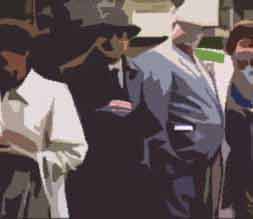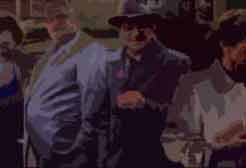
Sit-In, 1962 I didn't know her name: the dark-haired girl in the back corner of the paddywagon, the one who kicked the cop who dragged her from her stool at the lunch counter, the only one of us in cuffs. And the only one not singing. The rest of us have been singing like crazy, whether we know the words or not, but she's been cursing under her breath -- goddamn Nazis! -- the whole time, ever since the last of the demonstrators, two Negro ladies in matching pink dresses were loaded inside and the van's door closed. In fact, I don't know any of these people wedged in around me, white and Negro pressed sweatily together in the cramped, dark, poorly ventilated space. I'm an out-of-town visitor. A tourist, almost. Sent here to get acquainted with my mother's side of the family, the ones who threatened to disown her when she moved to California and joined the NAACP, back in the 40's before I was even born. And while I'm at it, I am to observe first-hand the workings of a segregated society. I will be expected to make a thorough report when I get home. This is the sort of thing my parents arrange for me to do, for educational purposes. Last summer I spent two weeks on a Navajo reservation in Arizona. The year before, it was a school for the blind. "Let's sing some more," urges one of the pink-dress women the instant we finish the last chorus of "Kumbayah." "God damn," mutters the dark-haired girl. It is the 12th of July, 1962. Welcome to Leopold, Virginia, where one week ago today four Negroes were arrested when they refused to leave the lunch counter at McAdoo's Drugs after being denied service. I learned about it on the TV news. Four men a week ago. How many of us today? Twenty-five? Thirty? Enough that they had to call for a second van. And next time there'll be more. All of us can feel it - an electricity, a current of goodwill that flows among us and joins us together, Negro to white to Negro. Segregation's days are numbered, we all know it. Equality for everyone is just around the corner. We're making history here today. There are no side windows in the van; no windows in the door either. A grill-covered slit between our compartment and the cab lets in a little light, but only a little, and there is very little air. Very little air and a lot of sweaty bodies and someone who ate beans last night. Still, at first it doesn't matter. We sing; we feel good about what we're doing. Some of us link arms or clasp hands, and the Negroes tell stories of previous sit-ins, previous arrests. They're veterans. The whites are mostly students, from colleges up north. I'm the only one still in high school. We listen respectfully to the Negroes. Most of us do, anyway. "Bastards," mutters the girl in the corner. "Redneck creeps." She's not from up north, and she's not from California. She sounds a little like a redneck creep herself. What's she doing here? She isn't acting the way we're supposed to act, and personally I'd like to tell her to shut up. I'm sure I'm not alone. We all try to pretend she isn't here, isn't part of our group. And maybe she isn't. Maybe she's a shoplifter, a criminal who accidentally got mixed up in our peaceful protest. Or maybe she's crazy. She seems coiled, somehow, and dangerous. "Amazing grace," sings an elderly Negro man, "how sweet the sound." His voice is thin and a little off-key, but that just makes it more genuine. The others join in: "To save a wretch like me." I've been an atheist for six months now; I sing along anyway. This is why I'm here, I tell myself. No matter how mad Uncle Joe and Aunt Alice get when they find out (and I frankly hope they get very mad; they're narrow-minded and complacent, in need of something like this to shake them up), this is worth it. This is even better than the Indian reservation. But then the road, which has been relatively straight and flat, begins to climb and dip, winding through the foothills toward the county seat. The pavement is rough, and in places the crown is so high we have to brace ourselves to keep from being thrown from our wooden benches to the floor. The singing stops. On and on we ride, climbing and descending in the sweltering near-dark. The van rocks and sways, slinging us against each other; the air is sour with sweat. Suddenly the boy on my right leans over, head between his knees, and barfs. I jerk my feet out of the way, not quite in time. My stomach rolls. "Jeez!" says the boy, "sorry!" and wipes his mouth on a Kleenex someone hands him. It's okay, we all tell him, don't worry abut it. But the smell is terrible. I breathe through my mouth, the rest of the ride a test of wills between my stomach and the rest of me. A few people try singing again; the girl in the corner continues to swear. Beside me, the boy makes a strangled sound and doubles over again. The singing trails off. "Bastards," mutters the girl. "Dumb-shit peckerwoods." Arizona was better. Definitely. At last the van lurches to a stop. Someone bangs on its side with his fist and then laughs. "Whutcha brung us?" his voice booms. He sounds easily eight feet tall. Another voice -- the driver's? -- answers: "Nother load-a apes." More laughter. I picture five or six men. I picture ropes, and trees with thick branches. Strange fruit -- my dad's a Billie Holiday fan. Inside the van it's absolutely still. I know I'm not the only one not breathing. "Never mind yer common ever-day black gorilla ape," calls a different voice. "You catch any-a them rare northern white gorilla ass-kissers?" The laughter rises, punctuated with little hoots and squeals that make me think of animals at feeding time. I shut my eyes and press myself as close to the wall as I can. Someone hits the van again, harder than before. "Come on, boy, how bout it? Let's open er up and see." And then, in a rush of light the door bangs open to reveal white sky and a bulky, trooper-hatted silhouette. The dark-haired girl says clearly, "What I see's a brainless motherfucker." Muthafucka, she pronounces it. The same way the men would, I have no doubt. "What?" trooper-hat barks. Whutt? "Who said that?" I sit very still, eyes closed, hoping there's no way I could possibly be mistaken for the sort of person who'd call a policeman a name like that. I'm a lawbreaker, that's true. But it's a bad law, and I have broken it politely. "What?" the man yells again, and the girl repeats: "Brainless...." For a big man, he's quick. In and out of there faster than I'd have believed possible. He steps on my foot as he lunges through the door, and on the way out, dragging the handcuffed girl by the elbow, either he kicks my ankle or she does. "Hey!" One of the Negro men starts to stand up, but thinks better of it. No one else moves, or says a word. "Motherfucker!" Outside the van now, out of sight. The door slams shut again, muffling the angry voices, the ominous, inarticulate other sounds. Something heavy slams into the side of the van, rocking it on its wheels. Inside, there's a shocked collective intake of breath. Outside, more laughter. Not another sound out of the girl. The Negroes are unloaded first and taken away. The rest of us - seven very young men and women, a long way from home - wait silently in the dark oven of the closed van. When the doors are finally opened again we breathe the clean air gratefully; when we are given instructions we follow them meekly and to the letter. No talking. We clamp our lips shut. Single file. We line up one behind the next like third-graders at the cafeteria door. "Don't push," someone says. Let's go, and we march in our line toward a low whitewashed building that is somehow all the more sinister for not looking one bit like any jail I'd ever imagined. Eyes front. I stare rigidly ahead, fighting down the urge to glance around for ... a dead body? a pool of blood? It's scary that there hasn't been another peep out of that girl; scarier than if I could hear moaning or crying. Did they take her away? Just leave her lying in the dirt? Better not to know. Better to follow instructions. Nothing too bad will happen if I do as I'm told. I'll tell them who my aunt and uncle are. My aunt and uncle will come get me and take me home. They'll be mad. They don't approve of sit-ins and they don't approve of people who get arrested, but they won't make me stay in jail and they're well known around here, people of influence in this part of the state. So nothing too bad will happen to me, as long as I do as I'm told. I fix my eyes on the belt of the young man in front of me. Hand-tooled leather, with a design of cactus and sidewinders, the name RUSTY in curly capitals. Maybe he's from the west too, I think, maybe even from California, where things like this don't happen. I don't think he's the same boy whose vomit still flecks my shoe. I study the letters of his name. And yet I need to know. That girl was beaten up. Policemen did it. I have witnessed or at least heard someone being beaten up by cops. My mind can't take it in. What it can take in, all of a sudden, is that if I make a wrong move someone may hit me too; that it might not matter who my aunt and uncle are. All the same, I pretend to stumble. I don't decide to do this, exactly, it just happens. I fake-stub my toe on a nonexistent rock, looking quickly around as I lurch out of line. No dead body, no pool of blood, but the girl is there. One of the big trooper-hats has her by one cuffed wrist, twisting her arms up behind her back so she's on tiptoe, bent forward at the waist. One eye is swollen. That much I can see. There's blood on her mouth. Then she sees me looking. Her head comes up and she gives me a broken-toothed, defiant grin. "Fucking Ku Klux...." Trooper-hat jerks her wrist upward. She gasps; her knees buckle but she doesn't fall. 
All on its own, my hand lifts itself. I have no choice: a quick, scared wave. And then, eyes front, I follow Rusty's belt through a heavy white door and into the room where, for the first time in my life, someone will record my fingerprints. ***
|